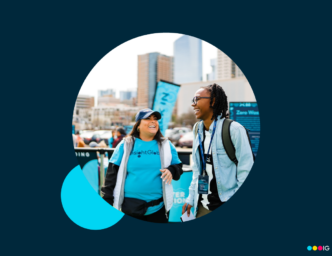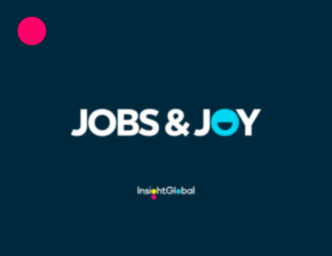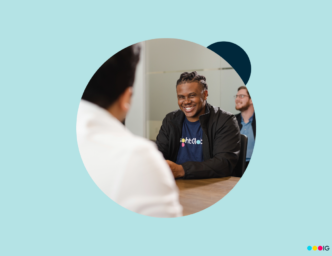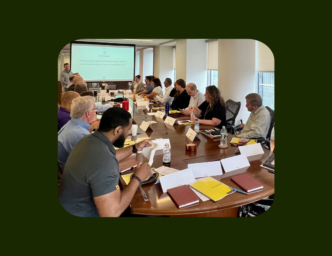Insight Global CEO Bert Bean opens up about his personal experiences with mental health and why he’s committed to providing mental health resources to his employees.
The door opened. I was frozen. I tried to speak but the words wouldn’t come out. The man in the doorway looked at me funny. I tried again. I really tried hard this time, but my voice just wouldn’t work. No words. Not even a groan. The man looked at my little brother who was standing on the porch with me. My 9-year-old brother just put his hands up in the air and looked as confused as the man. I bent over and put my hands on my knees. My mind was shouting at my voice “SPEAK! What’s wrong with you?” But I couldn’t. My brother and I backed off the man’s front porch and walked to the street.
I was 11 years old and going door to door in our neighborhood, trying to sell holiday wrapping paper for 5th grade class at school. My stutter was back, and it had a grip on me. Ever try to speak but not have the words? I don’t mean you don’t know what to say. I mean you CAN’T speak. You open your mouth, and you want to speak, but you physically can’t get your body to make the sound. It’s a shameful and lonely thing to feel. You feel incompetent and less than. You think to yourself, “How can others speak so freely, but I can’t? Am I stupid?” Heavy questions for an 11-year-old.
As a kid growing up, I had various types of stutters. Not only the kind where you can’t speak but also where you get stuck saying the same word and you can’t move off it. That one isn’t fun either. And by the way, every time someone tells you to just “slow down” that doesn’t help.
I also had other unique traits. I developed “habits” as they were called at the time. Every year in elementary school I developed a new habit. Most of them were nonverbal. I didn’t want to do them, but my brain would make me. I didn’t understand what was going on. The one where I would constantly pop my ears by sticking out my lower jaw was super distracting. My friends thought it was funny looking and couldn’t figure out why I was always doing it. They told me to stop. I couldn’t. I certainly didn’t want to. “It” made me.
Fortunately, as I got older, I grew out of my stutter and my habits. Actually, I just learned to live with them better. I learned how to focus intensely on every word I wanted to say, as I said it, and that helped me sound smoother in my speech. I transformed my “habits” into an ability to focus on and remember details, dates and names.
As I’ve learned more about mental health, I realized what I struggled with in my youth was severe anxiety and OCD. Lucky for me then, I always had great parents that supported me through it. Lucky for me now, I have a great wife who loves me even when I develop new “habits.”
What I’ve also learned about mental health is sometimes these things that hold us back, can also be our superpower. When you can’t speak well, you’re forced to deliberately work at it and create new techniques. This can help you become a great public speaker. When you obsess over certain nonverbal habits, you can channel that obsession into productive habits at school or work. This will turn you into an incredible producer.
Unfortunately, my optimistic view and thankfulness for my mental health struggles are not shared by all who struggle with mental health. Most people’s battles are silent and singular. I’d like to change that. I’d like to help people put a spotlight on that thing that grips them, laugh at it and blast it into a million pieces.
That’s why when my Insight Global coworkers Josh Seider, Greg Murray, and Emma Garber said we need to do something about the mental health crisis affecting so many in our company (and the country), it seemed as if I was struck by a bolt of lightning. We asked ourselves, “What if we just paid for mental health counseling for anyone who wanted it?”
As CEO I’m responsible for our people being productive. If there are things holding them back, it’s MY responsibility. Whether it’s technical training to do their job better or it’s helping them battle the demon of depression, their issues are ultimately my issues. So why not take care of “the whole person?”
This is what has led to our partnership with GROW Counseling, a mental health counseling firm we invited to move into our headquarters in Atlanta and help us take care of our people. In the first two months of our partnership, we already have over 1,000 people signed up and receiving counseling. That’s amazing. Think of the relief these people must be feeling–maybe for the first time in a long time. Think of how much the other parts of their lives will benefit. Their other relationships, too. And as their CEO, I can’t help but get excited when I think about how much better they’ll be at work, as we try to advance our purpose of being the light to the world around us.
As much as I hated that feeling of walking back to the curb with my tail between my legs as an 11-year-old with no voice, I’m grateful that kid gave me the confidence and the awareness to help others find their voice and to leave the darkness behind.
Thank you to Bert for sharing his experiences. Below, we share more information on the GROW Counseling partnership as well as how Insight Global is committed to supporting the mental health of its employees.
Insight Global announced it is spending $3 million in 2022 on services and training programs to support the mental health of its 4,600 employees. Those services include:
- Free counseling, regardless of insurance: through the aforementioned GROW Counseling partnership
- Mental health leadership training: supervisors and leaders receive in-depth mental health training to learn the practical skills to support colleagues, including “active listening,” identifying warning signs, what to do in serious situations and how to build a wellness plan
- Peer-to-peer support groups: connects colleagues with shared experiences (such as illnesses like cancer, fertility challenges, foster/adoption) to serve as sounding boards, provide guidance and form action plans (started during the COVID-19 pandemic)
“Companies have a responsibility to take care of their people,” Bean said in the press release announcing the mental health programs. “The faster companies can help ‘the whole person,’ the faster they will achieve their goals. For all companies, we only go as far as our people can carry us. With this belief, we can’t ignore our people’s mental health.
“Our industry is competitive. It requires hard work and focus to be successful. If our employees are not in a healthy place mentally or emotionally, it’s tough for them to succeed. One of our shared values at Insight Global is that we take care of each other. But that value is meaningless if we’re not willing to address what some people are afraid to even talk about—the mental health of our employees.”


 by Insight Global Staff
by Insight Global Staff



 by Erin Ellison
by Erin Ellison 
